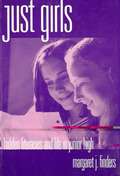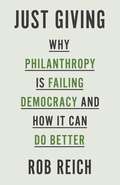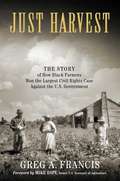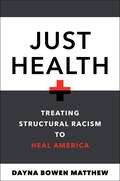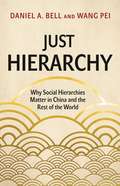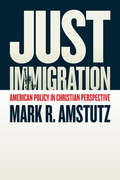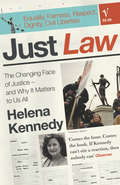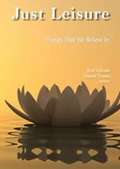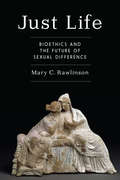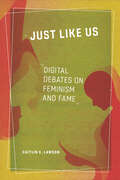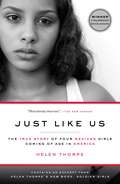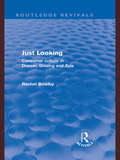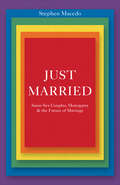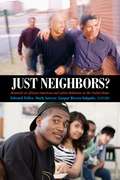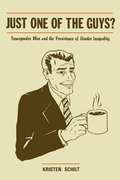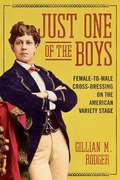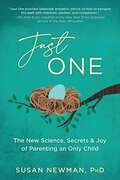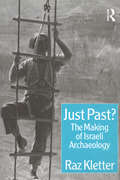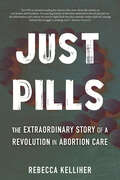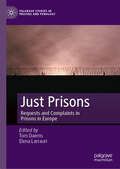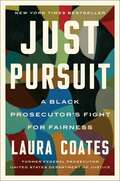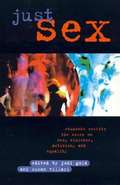- Table View
- List View
Just Girls: Hidden Literacies and Life in Junior High
by Margaret J. FindersHighlighting the social importance of friendship, family and social networks in girls' sense of themselves, she suggests that literacy plays an important role in maintaining friendship groups and in the construction of the self.
Just Giving: Why Philanthropy Is Failing Democracy and How It Can Do Better
by Rob ReichThe troubling ethics and politics of philanthropyIs philanthropy, by its very nature, a threat to today’s democracy? Though we may laud wealthy individuals who give away their money for society’s benefit, Just Giving shows how such generosity not only isn’t the unassailable good we think it to be but might also undermine democratic values and set back aspirations of justice. Big philanthropy is often an exercise of power, the conversion of private assets into public influence. And it is a form of power that is largely unaccountable, often perpetual, and lavishly tax-advantaged. The affluent—and their foundations—reap vast benefits even as they influence policy without accountability. And small philanthropy, or ordinary charitable giving, can be problematic as well. Charity, it turns out, does surprisingly little to provide for those in need and sometimes worsens inequality.These outcomes are shaped by the policies that define and structure philanthropy. When, how much, and to whom people give is influenced by laws governing everything from the creation of foundations and nonprofits to generous tax exemptions for donations of money and property. Rob Reich asks: What attitude and what policies should democracies have concerning individuals who give money away for public purposes? Philanthropy currently fails democracy in many ways, but Reich argues that it can be redeemed. Differentiating between individual philanthropy and private foundations, the aims of mass giving should be the decentralization of power in the production of public goods, such as the arts, education, and science. For foundations, the goal should be what Reich terms “discovery,” or long-time-horizon innovations that enhance democratic experimentalism. Philanthropy, when properly structured, can play a crucial role in supporting a strong liberal democracy.Just Giving investigates the ethical and political dimensions of philanthropy and considers how giving might better support democratic values and promote justice.
Just Harvest: The Story of How Black Farmers Won the Largest Civil Rights Case against the U.S. Government
by Greg FrancisWhen a class-action lawsuit against the US government results in a billion dollar settlement for the aggrieved parties, you&’d expect the story to be headline news . . .to be posted on social media everywhere . . . to be adapted to film or even to a popular legal procedural series on TV . . .So why then have so many people never heard of Pigford vs. Glickman? Or the follow-up lawsuit, Pigford II? Or the Black Farmers Case, as the pair of these legal actions is often called? Could it be that the heart-wrenching story of Black farmers in America, and the monumental legal case that brought long-sought justice to them, is rarely told because it reflects so poorly on the US and its treatment of those whose ancestors helped make the nation an agricultural giant in the first place? Whatever the reason, the time to tell the full story has come and the person to share the gripping details is Greg Francis, one of the lead counsels in the historic case that finally helped Black farmers achieve equity. In Just Harvest, Francis narrates the dramatic twists and turns of the legal battle fought and won, and evidences the many years of ingrained discrimination and racism that preceded it. Awareness of this story makes us all witnesses to the history still unfolding— and while parts of what is recounted herein will enrage you, the hope is that this book will also inspire, inform, and motivate you to join the continuing fight for the rights of all Black farmers now and in the future.
Just Health: Treating Structural Racism to Heal America
by Dayna Bowen MatthewChoice Outstanding Academic Title 2023The author of the bestselling Just Medicine reveals how racial inequality undermines public health and how we can change itWith the rise of the Movement for Black Lives and the feverish calls for Medicare for All, the public spotlight on racial inequality and access to healthcare has never been brighter. The rise of COVID-19 and its disproportionate effects on people of color has especially made clear how the color of one’s skin is directly related to the quality of care (or lack thereof) a person receives, and the disastrous health outcomes Americans suffer as a result of racism and an unjust healthcare system.Timely and accessible, Just Health examines how deep structural racism embedded in the fabric of American society leads to worse health outcomes and lower life expectancy for people of color. By presenting evidence of discrimination in housing, education, employment, and the criminal justice system, Dayna Bowen Matthew shows how racial inequality pervades American society and the multitude of ways that this undermines the health of minority populations. The author provides a clear path forward for overcoming these massive barriers to health and ensuring that everyone has an equal opportunity to be healthy. She encourages health providers to take a leading role in the fight to dismantle the structural inequities their patients face. A compelling and essential read, Just Health helps us to understand how racial inequality damages the health of our minority communities and explains what we can do to fight back.
Just Here, Doctor (The Dr Clifford Chronicles)
by Dr Robert CliffordJust Here, Doctor is the true story of a young country doctor and his patients - a richly entertaining and humorous chronicle of the life of a small West Country community as seen through the eyes of its G.P. Dr Clifford has some marvellous stories to tell: about the home delivery of a cricket fan's baby - in between overs of a televised Test Match; of the time he rode off on a gigantic horse to attend a hunting casualty - and rode back in an ambulance as the casualty; and the amazing saga of his student rugby tour of France - the craziest, most drunken ever undertaken. Here too, on the more serious side, are moving accounts of the courage of ordinary people in the face of serious, even fatal illness. Teeming with colourful and curious places and characters, Just Here, Doctor is packed with comedy, drama and tragedy, every bit as warm and enthralling as James Herriot's famous stories of a vet's life.
Just Hierarchy: Why Social Hierarchies Matter in China and the Rest of the World
by Daniel A. BellA trenchant defense of hierarchy in different spheres of our lives, from the personal to the politicalAll complex and large-scale societies are organized along certain hierarchies, but the concept of hierarchy has become almost taboo in the modern world. Just Hierarchy contends that this stigma is a mistake. In fact, as Daniel Bell and Wang Pei show, it is neither possible nor advisable to do away with social hierarchies. Drawing their arguments from Chinese thought and culture as well as other philosophies and traditions, Bell and Wang ask which forms of hierarchy are justified and how these can serve morally desirable goals. They look at ways of promoting just forms of hierarchy while minimizing the influence of unjust ones, such as those based on race, sex, or caste.Which hierarchical relations are morally justified and why? Bell and Wang argue that it depends on the nature of the social relation and context. Different hierarchical principles ought to govern different kinds of social relations: what justifies hierarchy among intimates is different from what justifies hierarchy among citizens, countries, humans and animals, and humans and intelligent machines. Morally justified hierarchies can and should govern different spheres of our social lives, though these will be very different from the unjust hierarchies that have governed us in the past.A vigorous, systematic defense of hierarchy in the modern world, Just Hierarchy examines how hierarchical social relations can have a useful purpose, not only in personal domains but also in larger political realms.
Just Hierarchy: Why Social Hierarchies Matter in China and the Rest of the World
by Daniel Bell Wang PeiA trenchant defense of hierarchy in different spheres of our lives, from the personal to the politicalAll complex and large-scale societies are organized along certain hierarchies, but the concept of hierarchy has become almost taboo in the modern world. Just Hierarchy contends that this stigma is a mistake. In fact, as Daniel Bell and Wang Pei show, it is neither possible nor advisable to do away with social hierarchies. Drawing their arguments from Chinese thought and culture as well as other philosophies and traditions, Bell and Wang ask which forms of hierarchy are justified and how these can serve morally desirable goals. They look at ways of promoting just forms of hierarchy while minimizing the influence of unjust ones, such as those based on race, sex, or caste.Which hierarchical relations are morally justified and why? Bell and Wang argue that it depends on the nature of the social relation and context. Different hierarchical principles ought to govern different kinds of social relations: what justifies hierarchy among intimates is different from what justifies hierarchy among citizens, countries, humans and animals, and humans and intelligent machines. Morally justified hierarchies can and should govern different spheres of our social lives, though these will be very different from the unjust hierarchies that have governed us in the past.A vigorous, systematic defense of hierarchy in the modern world, Just Hierarchy examines how hierarchical social relations can have a useful purpose, not only in personal domains but also in larger political realms.
Just Immigration: American Policy in Christian Perspective
by Mark R. AmstutzFew issues are as complex and controversial as immigration in the United States. The only thing anyone seems to agree on is that the system is broken. Mark Amstutz offers a succinct overview and assessment of current immigration policy and argues for an approach to the complex immigration debate that is solidly grounded in Christian political thought. After analyzing key laws and institutions in the US immigration system, Amstutz examines how Catholics, evangelicals, and main-line Protestants have used Scripture to address social and political issues, including immigration. He critiques the ways in which many Christians have approached immigration reform and offers concrete suggestions on how Christian groups can offer a more credible political engagement with this urgent policy issue.
Just Immigration: American Policy in Christian Perspective
by Mark R. AmstutzFew issues are as complex and controversial as immigration in the United States. The only thing anyone seems to agree on is that the system is broken. Mark Amstutz offers a succinct overview and assessment of current immigration policy and argues for an approach to the complex immigration debate that is solidly grounded in Christian political thought. After analyzing key laws and institutions in the US immigration system, Amstutz examines how Catholics, evangelicals, and main-line Protestants have used Scripture to address social and political issues, including immigration. He critiques the ways in which many Christians have approached immigration reform and offers concrete suggestions on how Christian groups can offer a more credible political engagement with this urgent policy issue.
Just Law
by Helena KennedyAcute, questioning, humane and passionately concerned for justice, Helena Kennedy is one of the most powerful voices in legal circles in Britain today. Here she roundly challenges the record of modern governments over the fundamental values of equality, fairness and respect for human dignity. She argues that in the last twenty years we have seen a steady erosion of civil liberties, culminating today in extraordinary legislation, which undermines long established freedoms. Are these moves a crude political response to demands for law and order? Or is the relationship between citizens and the state being covertly reframed and redefined?
Just Leisure: Things That We Believe In
by Daniel L. Dustin Keri SchwabThis book is intended to deepen your understanding of social and environmental justice in the context of leisure. It will spur your curiosity and bring you to your learning edge -- the place where you come when you are a little anxious and uncomfortable and where you can either pull back into your comfort zone and stay with the familiar or lean into your discomfort, suspend your disbelief, and open yourself to the possibility of learning something new. This book features 19 thought-provoking chapters with discussion questions and syntheses contributed by authors from the United States, Canada, and Australia. Whether you come to this work through your concern for the environment or through your desire for greater social equity among people, you come to justice work because you recognise the need for it and believe you can make a difference.
Just Life: Bioethics and the Future of Sexual Difference
by Mary C. RawlinsonJust Life reorients ethics and politics around the generativity of mothers and daughters rather than the right to property and the sexual proprieties of the oedipal drama. Invoking two concrete universals—everyone is born of a woman and everyone needs to eat—Rawlinson rethinks labor and food as relationships that make ethical claims and sustain agency. Just Life counters the capitalization of bodies under biopower with the solidarity of sovereign bodies.
Just Like Us: Digital Debates on Feminism and Fame
by Caitlin E. LawsonIn Just Like Us: Digital Debates on Feminism and Fame, Caitlin E. Lawson examines the rise of celebrity feminism, its intersections with digital culture, and its complicated relationships with race, sexuality, capitalism, and misogyny. Through in-depth analyses of debates across social media and news platforms, Lawson maps the processes by which celebrity culture, digital platforms, and feminism transform one another. As she analyzes celebrity-centered stories ranging from “The Fappening” and the digital attack on actress Leslie Jones to stars’ activism in response to #MeToo, Lawson demonstrates how celebrity culture functions as a hypervisible space in which networked publics confront white feminism, assert the value of productive anger in feminist politics, and seek remedies for women’s vulnerabilities in digital spaces and beyond. Just Like Us asserts that, together, celebrity culture and digital platforms form a crucial discursive arena where postfeminist logics are unsettled, opening up more public, collective modes of holding individuals and groups accountable for their actions.
Just Like Us: The True Story of Four Mexican Girls Coming of Age in America
by Helen ThorpeA powerful and moving account of four young women from Mexico who have lived most of their lives in the United States and attend the same high school. Two of them have legal documentation and two do not. Just Like Us is their story. A stunning work of in-depth journalism in the tradition of Random Family, Helen Thorpe's Just Like Us takes us deep into an American subculture -- that of Mexican immigrants -- largely hidden from the mainstream. We meet four girls on the eve of their senior prom, in Denver, Colorado. Each is bright and ambitious and an excellent student. Their leader, Marisela, dazzles teachers during the day and spends her evenings checking groceries to help pay the bills. She dreams of college and a professional career -- but she doesn't have a green card or a Social Security number because her parents brought her across the border illegally. Marisela's best friend, Yadira, shares her predicament. But they spend all of their time with two girls who are legal -- Elissa, who was born in the United States, and Clara, who has a green card. Each of the girls views the others as her equals, yet the world does not treat them that way. Their situation becomes increasingly painful and complex as the four young women approach adulthood, and Marisela and Yadira watch their two legal friends gain opportunities that are not available to them. All four hold American aspirations, but only Clara and Elissa have the documents necessary to realize those hopes. Their friendship starts to divide along lines of immigration status. Then a political firestorm begins. An illegal immigrant commits a horrendous crime in Denver, and a local congressman seizes on the act as proof of all that is wrong with American society. Arguments over immigration rage fiercely, and the girls' lives play out against a backdrop of intense debate over whether they have any right to live in the country where they have grown up. This brilliant, fast-paced work of narrative journalism is a vivid coming-of-age story about girlhood, friendship, and, most of all, identity -- what it means to fake an identity, steal an identity, or inherit an identity from one's parents and country. No matter what one's opinions are about immigration, Just Like Us offers fascinating insight into one of our most complicated social issues today. The girls, their families, those who welcome them, and those who object to their presence all must grapple with the same deep dilemma: Who is an American? Who gets to live in America? And what happens when we don't agree?
Just Looking: Consumer Culture in Dreiser, Gissing and Zola (Routledge Revivals)
by Rachel BowlbyThe spectacular development of early consumer society in Britain, France and the United States had a profound impact on constructions of femininity and masculinity, and commercial and cultural values in the late nineteenth and early twentieth centuries. Focusing on novels by Theodore Dreiser, George Gissing and Emile Zola, Just Looking, first published in 1985, addresses itself to a central paradox of the period: the perceived antithesis of the terms "commerce" and "culture" which emerged at a time which saw the actual drawing together of commercial and cultural practices. Drawing on structural, psychoanalytic and Marxist-feminist theory, Rachel Bowlby retrieves a relatively neglected literary area for contemporary political and theoretical concerns, re-establishing the naturalist novel as a rich source for feminists, literary theorists and cultural historians.
Just Married
by Stephen MacedoThe institution of marriage stands at a critical juncture. As gay marriage equality gains acceptance in law and public opinion, questions abound regarding marriage's future. Will same-sex marriage lead to more radical marriage reform? Should it? Antonin Scalia and many others on the right warn of a slippery slope from same-sex marriage toward polygamy, adult incest, and the dissolution of marriage as we know it. Equally, many academics, activists, and intellectuals on the left contend that there is no place for monogamous marriage as a special status defined by law. Just Married demonstrates that both sides are wrong: the same principles of democratic justice that demand marriage equality for same-sex couples also lend support to monogamous marriage.Stephen Macedo displays the groundlessness of arguments against same-sex marriage and defends marriage as a public institution against those who would eliminate its special status or supplant it with private arrangements. Arguing that monogamy reflects and cultivates our most basic democratic values, Macedo opposes the legal recognition of polygamy, but agrees with progressives that public policies should do more to support nontraditional caring and caregiving relationships. Throughout, Macedo explores the meaning of contemporary marriage and the reasons for its fragility and its enduring significance. His defense of reformed marriage against slippery slope alarmists on the right, and radical critics of marriage on the left, vindicates the justice and common sense of the emerging consensus. Casting new light on today's debates over the future of marriage, Just Married lays the groundwork for a stronger institution.
Just Neighbors?: Research on African American and Latino Relations in the United States
by Edward Telles Mark Sawyer Gaspar Rivera-SalgadoBlacks and Latinos have transformed the American city—together these groups now constitute the majority in seven of the ten largest cities. Large-scale immigration from Latin America has been changing U.S. racial dynamics for decades, and Latino migration to new destinations is changing the face of the American south. Yet most of what social science has helped us to understand about these groups has been observed primarily in relation to whites—not each other. Just Neighbors? challenges the traditional black/white paradigm of American race relations by examining African Americans and Latinos as they relate to each other in the labor market, the public sphere, neighborhoods, and schools. The book shows the influence of race, class, and received stereotypes on black-Latino social interactions and offers insight on how finding common ground may benefit both groups. From the labor market and political coalitions to community organizing, street culture, and interpersonal encounters, Just Neighbors? analyzes a spectrum of Latino-African American social relations to understand when and how these groups cooperate or compete. Contributor Frank Bean and his co-authors show how the widely held belief that Mexican immigration weakens job prospects for native-born black workers is largely unfounded—especially as these groups are rarely in direct competition for jobs. Michael Jones-Correa finds that Latino integration beyond the traditional gateway cities promotes seemingly contradictory feelings: a sense of connectedness between the native minority and the newcomers but also perceptions of competition. Mark Sawyer explores the possibilities for social and political cooperation between the two groups in Los Angeles and finds that lingering stereotypes among both groups, as well as negative attitudes among blacks about immigration, remain powerful but potentially surmountable forces in group relations. Regina Freer and Claudia Sandoval examine how racial and ethnic identity impacts coalition building between Latino and black youth and find that racial pride and a sense of linked fate encourages openness to working across racial lines. Black and Latino populations have become a majority in the largest U.S. cities, yet their combined demographic dominance has not abated both groups’ social and economic disadvantage in comparison to whites. Just Neighbors? lays a much-needed foundation for studying social relations between minority groups. This trailblazing book shows that, neither natural allies nor natural adversaries, Latinos and African Americans have a profound potential for coalition-building and mutual cooperation. They may well be stronger together rather than apart.
Just One Of The Guys?: Transgender Men and the Persistence of Gender Inequality
by Kristen SchiltThe fact that men and women continue to receive unequal treatment at work is a point of contention among politicians, the media, and scholars. Common explanations for this disparity range from biological differences between the sexes to the conscious and unconscious biases that guide hiring and promotion decisions.
Just One of the Boys: Female-to-Male Cross-Dressing on the American Variety Stage (Music in American Life)
by Gillian M RodgerFemale-to-male crossdressing became all the rage in the variety shows of nineteenth century America, and began as the domain of mature actresses who desired to extend their careers. These women engaged in the kinds of raucous comedy acts usually reserved for men. Over time, as younger women entered the specialty, the comedy became less pointed, and came to center on the celebration of male leisure and fashion. Gillian M. Rodger uses the development of male impersonation from 1820 to 1920 to illuminate the history of the variety show. Exploding notions of high- and lowbrow entertainment, Rodger looks at how both performers and forms consistently expanded upward toward respectable ”and richer ”audiences. At the same time, she illuminates a lost theatrical world where women made fun of middle class restrictions even as they bumped up against rules imposed in part by audiences. Onstage, the actresses' changing performance styles reflected gender construction in the working class and shifts in class affiliation by parts of the audiences. Rodger observes how restrictive standards of femininity increasingly bound male impersonators as new gender constructions allowed women greater access to public space while tolerating less independent behavior from them.
Just One: The New Science, Secrets & Joy of Parenting an Only Child
by Susan NewmanDiscover why having one child is not only a preferred family size, but also a most enriching path to creating a thriving, happy family. Drawing from groundbreaking new research and interviews with over 100 families, renowned psychologist Susan Newman, Ph.D. dismantles the outdated myths about only children while providing a roadmap for confident parenting decisions. Whether you're contemplating your family's size or already raising an only child, this authoritative guide addresses the most pressing concerns: Is one child right for me? Am I being selfish? No sibling: Am I cheating my child? What are the benefits of being an only child? Why the "selfish, lonely only" stereotypes no longer hold up How to raise a well-adjusted, compassionate only child Is caring for aging or ill parents too much for one child? More and more families are embracing the solo child with little to no pressure from family and friends to have another. The one-child family has become desired in the U.S. and worldwide in developed countries. China, England, Korea, France and Canada have already been labeled &“one-child nations.&”Just One explores the striking changes in cultural norms and personal challenges driving the popularity of the one-child family: from women starting families older and the high cost of raising children to women wanting to work and climate change concerns. Written by one of America's leading parenting experts who has been featured in Psychology Today, The New York Times, and NPR, Just One offers evidence-based strategies for nurturing competent, independent only children. This timely guide speaks to a new generation of parents who are redefining what makes a perfect family size.
Just Past?: The Making of Israeli Archaeology
by Raz KletterThe land of Israel is rich in history and material culture and has long been the location of extensive archaeological excavation. 'Just Past?' examines the origins of Israeli archaeology in the 1950s and 1960s. Drawing on previously unpublished documentary material, the study offers a history of intriguing finds, failures and dreams. 'Just Past?' covers a range of topics, from the 1948 war to the Israel Department of Antiquities and Museums, issues of foreign aid, and the political circumstances behind the decision to start excavations at Masada. Highlighting the centrality of politics to archaeology in Israel/Palestine, 'Just Past?' presents an assessment of the origins of Israeli archaeology which will be invaluable to students and scholars of history and archaeology.
Just Pills: The Extraordinary Story of a Revolution in Abortion Care
by Rebecca KelliherAs women's rights are increasingly under attack, journalist Rebecca Kelliher dives into the gripping history of abortion pills, weaving together the many people who, across decades and continents, have sought to ensure access to these medicationsSpanning more than a century and several continents, with a tenacious cast of feminist activists, scientists, politicians, doctors, and abortion seekers, Just Pills tells the fascinating history of mifepristone and misoprostol, better known as abortion pills.Millions of women around the world for more than two decades have been using one or both of these medications to safely end their own pregnancies, within or outside the law. These pills continue to hold a promise of expanding abortion access for all. Rebecca Kelliher dives into their invention, their legalization battles, and the ongoing proliferation of care models under bans, deftly introducing people who strive for better.As women&’s rights to control their own bodies are increasingly undermined in the US, this little-known history of the many people behind these life-saving medications will educate, enrage, and inspire.
Just Prisons: Requests and Complaints in Prisons in Europe (Palgrave Studies in Prisons and Penology)
by Tom Daems Elena LarrauriThis edited book explores how requests and complaints by prisoners are being dealt with by prison governors/administrations or independent bodies (such as complaint commissions), in different parts of Europe. It asks who complains and why? How are complaints from prisoners being dealt with, from a legal and empirical point of view? How do procedures work and can they be considered effective? Should administrative procedures be exhausted before appealing to a judge? It explores whether such systems comply with international regulation, such as the European Prison Rules, the UN Mandela Rules or the case-law of the ECtHR. It speaks to academics, NGOs and lawyers with an interest in prison law, human rights bodies and prison monitoring bodies.
Just Pursuit: A Black Prosecutor's Fight for Fairness
by Laura Coates&“A firsthand, eye-opening story of a prosecutor that exposes the devastating criminal punishment system. Laura Coates bleeds for justice on the page.&” —Ibram X. Kendi, National Book Award–winning author of Stamped from the Beginning and How to Be an AntiracistWhen Laura Coates joined the Department of Justice as a prosecutor, she wanted to advocate for the most vulnerable among us. But she quickly realized that even with the best intentions, &“the pursuit of justice creates injustice.&” Through Coates&’s experiences, we see that no matter how fair you try to fight, being Black, a woman, and a mother are identities often at odds in the justice system. She and her colleagues face seemingly impossible situations as they teeter between what is right and what is just. On the front lines of our legal system, Coates saw how Black communities are policed differently; Black cases are prosecuted differently; Black defendants are judged differently. How the court system seems to be the one place where minorities are overrepresented, an unrelenting parade of Black and Brown defendants in numbers that belie their percentage in the population and overfill American prisons. She also witnessed how others in the system either abused power or were abused by it—for example, when an undocumented witness was arrested by ICE, when a white colleague taught Coates how to unfairly interrogate a young Black defendant, or when a judge victim-blamed a young sexual assault survivor based on her courtroom attire. Through these revelatory and captivating scenes from the courtroom, Laura Coates explores the tension between the idealism of the law and the reality of working within the parameters of our flawed legal system, exposing the chasm between what is right and what is lawful.
Just Sex: Students Rewrite the Rules on Sex, Violence, Equality and Activism
by Jodi Gold Susan VillariArmed with three decades of feminism, men and women are coming to college with different ideas and expectations about sexual freedom and violence than did their parents. Since the early 1980's, a student movement has emerged from the belief that sexual violence is neither inherent nor inevitable. Just Sex: Students Rewrite the Rules on Sex, Violence, Equality and Activism chronicles the move to end to all forms of sexual violence and to mold a new sexual paradigm where explicitly consensual sex and sexual autonomy are the norm. <p><p> Based on ten years of collaborative research and national organizing, Gold and Villari have compiled the writings of leading student activists and young scholars wrestling with complex issues of power inequities, free speech, and societal constructions of gender and sexuality in accessible and mainstream dialogues. Authors also examine the generationally specific style of student activism which emphasizes peer education and institutional collaboration. <p> Just Sex―the first ever gathering of primary documents including university policies, personal testimonies, position papers and scholarly essays―offers a glimpse of the "working papers" of a student movement which has altered the sexual landscape of our campuses and communities forever. This valuable volume will be of interest to student activists, administrators, and anyone interested in ending violence on and off of campus.
